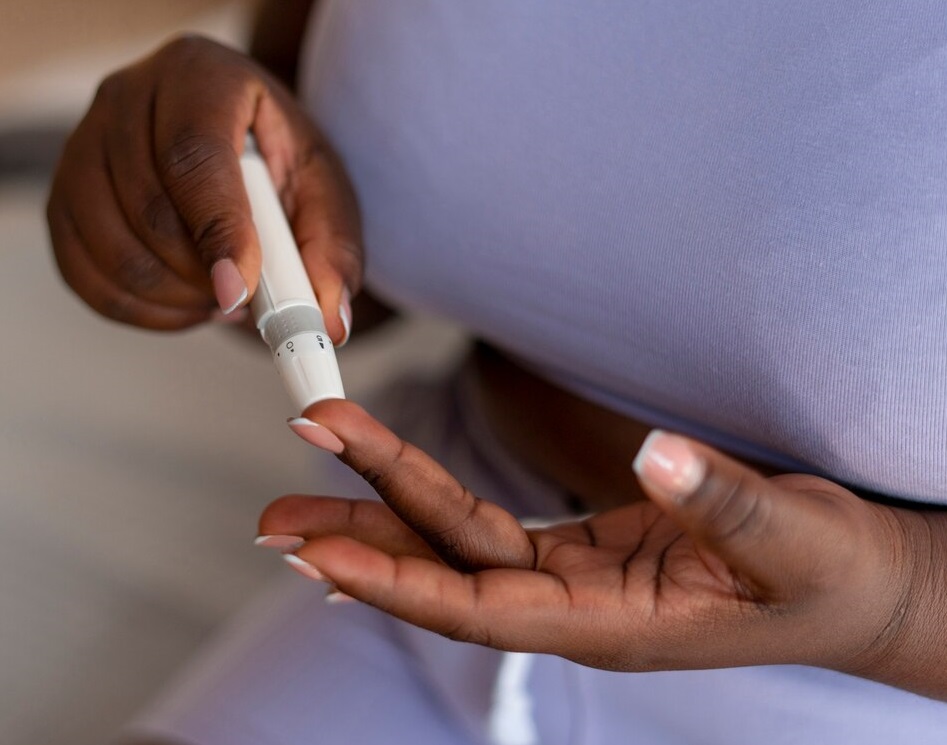By Nr Chinonso Cynthia Ukah. BNSc, RN, RM. Freelance Health Writer and DLHA Volunteer. Medically reviewed by the DLHA Team

A pregnant black woman holding her bulging abdomen in her hands.
Introduction
Diabetes in pregnancy can develop when a woman is pregnant or before she gets pregnant. [1] Regardless of when it develops, it causes a higher than normal amount of blood sugar to be present in the blood. This is harmful to both mother and her unborn child.
The purpose of this article is to explain the different forms of diabetes in pregnancy to African women and men, so that they have information that would help in securing better pregnancy outcome for themselves and their baby. The information provided is not a substitute for the professional counsel and care that you will obtain from your healthcare providers, but it will cover the types, causes, risk factors, and ways of prevention and management of diabetes in pregnancy.
If you have any concerns or questions, always feel free to speak with your doctor or midwife.
There are two forms of diabetes that women globally and in Africa can experience while pregnant:
PGDM refers to diabetes that exists before pregnancy, including both Type 1 and Type 2 diabetes. Studies show that among diabetic women under 49 years old, about 1% who become pregnant face complications related to their pre-existing diabetes. [1]
If you are diabetic and intend to get pregnant, keeping your blood sugar levels at a normal range before you conceive and during the first trimester is very important. These periods are critical points where uncontrolled type 1 or 2 DM can cause spontaneous abortions, stillbirths, and newborn deaths.
These are saddening experiences for women and their partners considering how long a woman carries a baby in her womb and losing it in the end.
Related: Type 1 Diabetes Mellitus: An Explainer for Africans and Type 2 Diabetes: What Africans Need to Know
This is first detected when a woman is pregnant and usually develops in the second half of pregnancy. It is a condition caused by a hormone(s) that is made during pregnancy, which lets sugar (glucose) to build up in the blood instead of being absorbed by the cells. The estimated global occurrence of GDM is said to be 1.7 to 15.7 percent depending on the woman's ethnic origin, her age, and the basis of diagnosis. [1]
GDM can cause several complications in the unborn baby, like:
Diabetic mothers generally, usually give birth to very large babies which is termed macrosomia. Good control of blood sugar levels during pregancy can reduce the possibility of these complications arising.
Gestational diabetes is a common pregnancy complication affecting about 15% of pregnant women worldwide, or roughly 1 in 7 pregnancies.
Its prevalence varies significantly by location. For instance, in sub-Saharan Africa, it affects around 14% of pregnant women, while in Ethiopia, there's a notable urban-rural divide with 13% prevalence in cities compared to 5% in rural areas.
Importantly, the incidence of gestational diabetes is on the rise with more cases being reported from low- and middle-income countries such as those in sub-Saharan Africa. [2]
For pregestational diabetes, the causes are the same as those responsible for type 1 and type 2 diabetes.
The cause of GDM is not known, but there are strong scientific speculations (theories) as to why the condition occurs. A placental hormone known as lactogen has been identified as a major cause of diabetes in pregnancy. [3] In nondiabetic pregnant women, its function is to reduce the blood sugar levels to normal levels thus avoiding any form of diabetes.
This hormone acts in reverse in diabetic pregnant women. Here, it increases insulin resistance, thus preventing the high sugar in the blood from going into the woman's body cells. This accumulates and causes diabetes in pregnancy. [3]
These risk factors include:
The truth is, you may may have diabetes in pregnancy and don't know that you do, because you have no identifiable health issues (symptoms). When you have symptoms, they may include the following:
The diagnosis of gestational diabetes involves your doctor taking a history and performing a physical examination. At the end of the examination, your doctor may ask you to take some tests to confirm if you have diabetes in pregnancy or not.
Doctors usually test for gestational diabetes between 24-28 weeks of pregnancy. [4] This timing is chosen because:
1. Your body naturally becomes more resistant to insulin as pregnancy progresses.
2. Testing too early might miss some cases.
3. Testing too late doesn't leave enough time for its proper management before delivery occurs. [4]
There are two ways that you may be tested for diabetes during pregnancy.
You'll drink a measured quantity of glucose solution and have your blood sugar tested after 2 hours. This is called an oral glucose tolerance test (OGTT). [4]
All pregnant women should get tested for diabetes in pregnancy. However, due to screening limitations, healthcare providers in some countries in Africa only test those women who present with some of the risk factors discussed earlier.
If you're diagnosed with gestational diabetes (GDM), you'll need another test about 6 weeks after giving birth to make sure your blood sugar has returned to normal. [4]
Many women who develop gestational diabetes have healthy pregnancies and babies with proper management. That is why early detection and proper management comes first. If you have any concerns or questions, always feel free to ask your doctor or midwife.
Your doctor or midwife may recommend one or all of the 3 steps of treatment for you to follow depending on the level of sugar in your blood and your risk level. These are:
This involves:
 This is very important for women getting insulin injection to treat their diabetes in pregnancy. Regular blood sugar monitoring helps you know the right dose to inject each day.
This is very important for women getting insulin injection to treat their diabetes in pregnancy. Regular blood sugar monitoring helps you know the right dose to inject each day.
Medications in common use in the treatment of diabetes in pregnancy may include:
This is often a first choice if medication is needed. It's safe for the baby because it doesn't cross the placenta. You'll be taught how to give yourself insulin injections and adjust the dose based on your blood sugar readings.
Sometimes, pills like metformin are used but only after careful consideration. These can have some more severe side effects compared to insulin.
There are proven ways to prevent diabetes in pregnancy if you have any of the risk factors that were previously discussed. These are:
Diabetes in pregnancy, whether pregestational or gestational, poses significant risks to both mother and baby. However, with early detection, proper management, and preventive measures, these risks can be substantially reduced or contained.
African women, particularly those with risk factors, should be vigilant about their health before and during pregnancy. Undertaking regular prenatal check-ups, maintaining a healthy lifestyle, and following medical advice are important steps to adopt in ensuring a healthy pregnancy and baby.
As the prevalence of diabetes in pregnancy continues to rise, especially in countries in sub-Sagaran Africa, raising awareness and improving access to screening and management resources becomes increasingly important.
Healthcare providers, public health managers, and community stakeholders in health like the media community associations, traditional and religious leaders, influencers should work together to raise more awareness in order to reduce the incidence of diabetes in pregnancy in the region..
1. Ornoy A, Becker M, Weinstein-Fudim L, Ergaz Z. Diabetes during pregnancy: a maternal disease complicating the course of pregnancy with long-term deleterious effects on the offspring. a clinical review. Int J Mol Sci. 2021 Mar 15;22(6):2965. doi: 10.3390/ijms22062965. Available from here.
2. Tola A, Assefa N, Dessie Y, et al. Epidemiology of hyperglycemia during pregnancy in Ethiopia: prevalence, associated factors, and feto-maternal outcomes: systematic review and meta-analysis. Syst Rev. 2024;13:116. doi: 10.1186/s13643-024-02526-z. Available from here.
3. Quintanilla Rodriguez BS, Vadakekut ES, Mahdy H. Gestational Diabetes. In: StatPearls [Internet]. Treasure Island (FL): StatPearls Publishing; 2024 [updated 2024 Jul 14]. Available from here.
4. Moon JH, Jang HC. Gestational Diabetes Mellitus: Diagnostic Approaches and Maternal-Offspring Complications. Diabetes Metab J. 2022 Jan;46(1):3-14. doi: 10.4093/dmj.2021.0335. Available from here.
5. Rani PR, Begum J. Screening and Diagnosis of Gestational Diabetes Mellitus, Where Do We Stand. J Clin Diagn Res. 2016 Apr;10(4):QE01-QE04. doi: 10.7860/JCDR/2016/17588.7689. Available from here.
6. InformedHealth.org [Internet]. Cologne, Germany: Institute for Quality and Efficiency in Health Care (IQWiG); 2006-. Gestational diabetes: Learn More – What can help prevent gestational diabetes? [Updated 2024 Apr 17]. Available from here.
Related: Complications of Diabetes in Pregnancy: What African Women Need to Know
Published: October 11, 2024
© 2024. Datelinehealth Africa Inc. All rights reserved.
Permission is given to copy, use and share content for non-commercial purposes without alteration or modification and subject to source attribution.
DATELINEHEALTH AFRICA INC., is a digital publisher for informational and educational purposes and does not offer personal medical care and advice. If you have a medical problem needing routine or emergency attention, call your doctor or local emergency services immediately, or visit the nearest emergency room or the nearest hospital. You should consult your professional healthcare provider before starting any nutrition, diet, exercise, fitness, medical or wellness program mentioned or referenced in the DatelinehealthAfrica website. Click here for more disclaimer notice.